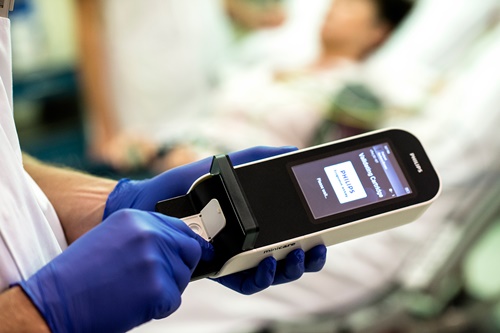7 January 2016. A collaboration between electronics manufacturer Royal Phillips and medical diagnostics company Banyan Biomarkers Inc. is developing a handheld blood test for concussions and other mild traumatic brain injuries. Financial and intellectual property aspects of the partnership were not disclosed.
Traumatic brain injury is caused by a blow or jolt to the head, as well as injuries where the skull is penetrated. Not all bumps to the head cause injury, but when normal functions of the brain are affected, traumatic brain injury occurs, with mild injuries, known as concussions, the most common form. Centers for Disease Control and Prevention says some 2.5 million emergency room visits, hospitalizations, or deaths in the U.S. were attributed to traumatic brain injury in 2010, leading to 50,000 fatalities.
Diagnosing concussions quickly and conclusively is difficult, because symptoms are not always evident, and may not be detected even with CT scans. Diagnosis is particularly tricky with athletes. From 2001 to 2009, reports CDC, traumatic brain injuries related to sports or recreation increased by 57 percent among children, age 19 or younger.
Banyan Biomarkers, in San Diego, licenses research from University of Florida to commercialize lab tests that detect brain injury and neurological diseases. The company’s technology assesses proteins in blood and other bodily fluids with antibodies associated with specific disorders, which in this case can also be quantified to estimate the extent of brain injury. Banyan tested the technology in several clinical studies identifying two biomarkers in blood serum and plasma for traumatic brain injury.
Royal Phillips, based in Amsterdam, and Banyan will develop a blood test for mild brain trauma that can be administered and return results at the point of care. The system will adapt Phillips’s Minicare blood testing device that returns results in a few minutes. The device requires a pinprick blood sample analyzed with a sensor in a replaceable cartridge and dedicated software. The sensor in this case will be configured to detect the target molecules identified by Banyan.
Read more:
- Detailed Brain Activity Imaging Being Developed
- Spin-Off Formed to Develop Brain Disorder Therapies
- Campaign Seeks More Minorities in Brain Disorder Trials
- Eye Tracking System Devised to Diagnose Brain Injuries
- University Starts Computer Science/Brain Research Consortium
* * *


 RSS - Posts
RSS - Posts
You must be logged in to post a comment.